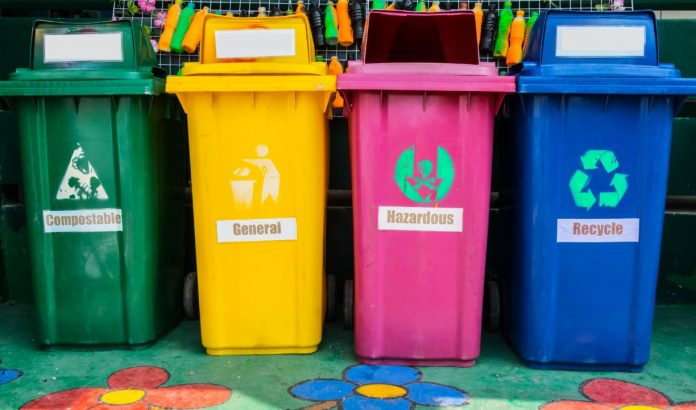In 2018, the UK government published a waste management strategy for England. It set out various targets for waste reduction and sustainability. One of these targets was that 50 per cent of household waste should be recycled by 2020. The realisation of this target is yet to be demonstrated and published. However, the government remains optimistic.
However, while local authorities continue to combat household waste, another public sector is being neglected. Figures indicate that the education sector only recycles around 23 per cent of its waste.
Primary schools generate 45kg of waste per pupil, while secondary schools produce 22kg per pupil. This totals 250,000 tonnes of waste every year.
While the figure is disappointing, it does not detract from the enthusiasm of students to utilise more sustainable practices in their schools. Many students have encouraged authorities to ensure that the environment is a priority. Recycling, composting, and litter picking are all aspects of waste management that children are helping to put into motion.
Here, we look at why waste is a problem for educational institutions, and how schools and local authorities can help combat this problem.
Wasteful spending
Education requires a lot of resources. It is unsurprising, therefore, that 70 per cent of all education waste is made up of food, paper, and card. However, while 80 per cent of this waste is recyclable, the reality is that only 20 per cent of it is actually recycled.
Food waste in the education sector is particularly expensive. The price of procurement, labour, utilities, and waste management means that food waste can cost £2,100 per tonne. Over the course of a year, local authorities will dish out £250 million to manage food waste.
Equally, Landfill Tax adds to an avoidable cost which schools could manage better. Estimates suggest that local authorities could save £6.4 million by utilising more sustainable methods of waste management.
The problem can be tackled by both local authorities and individually at education organisations.
Sustainable schools lead the way
The Eco-School campaign has registered 52,000 schools across 67 countries. These schools follow a seven-step framework to claim a coveted green flag. The steps include forming an eco-committee of students, making an action plan, and putting that plan into motion. Some schools can compost more or grow their own fruit and vegetables on school grounds.
Meanwhile, other schools are taking more proactive measures to reduce waste. Biomass digesters are used to transform food waste into biofuel. This can then be used for heating and energy. On school grounds, this device not only reduces waste. It can also cut emissions from transporting waste to disposal facilities.
Composting is also a common practice at many schools getting to grips with sustainability. Most unavoidable waste, such as eggshells and tea bags, can be composted. Meanwhile, cooked food is better suited to wormeries. Primarily, avoiding food waste is achieved by encouraging students to eat all of their lunch.
Local authorities tackling problems
The main focus for local authorities regarding waste management is to reduce overheads and operating costs. With increasing budget restraints, new solutions are needed to combat this problem.
Avoiding landfill is an obvious option for local authorities to save money. However, school waste going to landfill may be an unavoidable consequence. Public waste services are also struggling with stripped budgets. Instead, contracting waste management businesses may be the solution. They can implement waste strategy plans and organise waste effectively.
Single-stream waste recycling is becoming increasingly common across all sectors. And even local government offices are becoming more aware of their waste responsibilities. Most use waste procurement and waste removal companies. They can organise and dispose of their waste, with assurance that sustainability is ensured.
Education centres can also benefit from this approach if it’s implemented by local authorities. Commercial businesses must follow stringent guidelines when it comes to waste. They must ensure that everything is done to reuse, recycle, or recover waste—in this order. It’s therefore surprising that education isn’t currently achieving the same. With recycling targets for household waste at 50 per cent, it should be possible for the education sector to meet those targets too. Especially when education waste consists of predominantly recyclable materials.
One waste removal specialist company indicates that education is pivotal to ensuring waste is disposed of properly. Michael Taylor, General Manager at Skip Hire UK says: “Schools have a duty to lead by example and give the next generation the tools, ideas, and logic to make sound decisions with regards to environmental best practice.
“Education is key here — and while there is no perfect world, doing the right thing in the most cost-effective manner will always be a solid principle to adhere to. Companies like ours and others across the industry will always look to assist schools to promote and educate future generations.”
Leading by example is the best form of education. Depriving students of the opportunity to work in an environment where sustainability is a priority is damaging. Students have a considerable enthusiasm for climate change. They understand the consequences of unsustainable practices. Schools must continue to use their platform to inspire the next generation to use waste responsibly and ensure they remain leaders in the green revolution.
Sources
https://www.gov.uk/government/publications/resources-and-waste-strategy-for-england
https://www.wrap.org.uk/content/new-study-shows-great-potential-recycling-school-waste
https://www.gov.uk/government/publications/rates-and-allowances-landfill-tax/landfill-tax-rates-from-1-april-2013
https://www.eco-schools.org.uk//howitworks/







